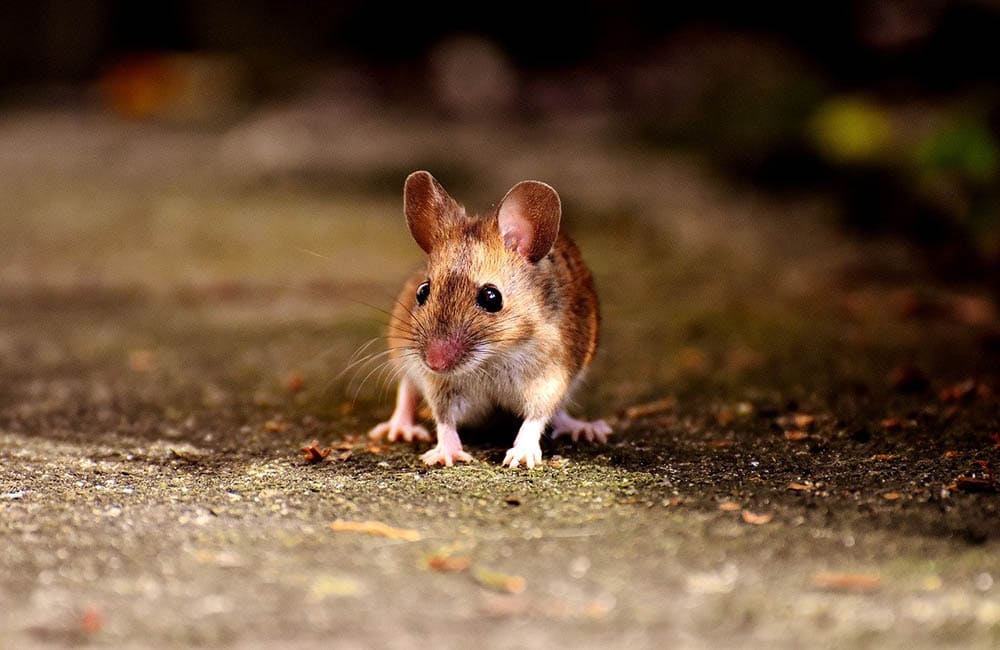
Most people have experienced mice in their homes at one point or another—the scratching in the walls and the holes in bags of food. But you hardly ever actually see the mice (unless you have a cat, in which case, you might wake up to a mouse on your pillow. Ew).
Why do we never see them, though? Are they just that sneaky, or is it because they’re nocturnal creatures? And if they are nocturnal and only rummage around homes at night, does that mean they can see in the dark?
Are Mice Nocturnal?

Yes, they are! At least, for the most part. Mice in homes prefer going about their business during night hours, but it depends on their environment. If you work at night, mice will be more likely to come out and play during the day when you’re away.
Mice like to be safe, so they pick times to come out when they sense the least amount of danger. Wild mice are usually active during dusk and dawn hours because there is very little light, and little light means it is harder for predators to see them.
So, the preference for low-light conditions must mean they can see in the dark, right?
Can Mice See In The Dark?
Mice cannot see in the dark. Do you remember the childhood nursery rhyme about the three blind mice? Well, that’s not too far from the truth.
Mice have impaired vision—bad enough that if they were humans, they’d be legally blind. So, they can’t see well in general. However, their eyes have adapted to enable them to survive despite this, particularly in the dark.
Though technically color-blind and unable to see things that are a mere foot or two away, mice can detect motion in low light situations—up to 45 feet away!
How Do Mice Get Around In The Dark?
So, since mice can’t see in the dark, how exactly do they get around? While they can use their eyes to detect motion in the dark, the rest of the job of getting around is done by using their whiskers, nose, and ears.
Mice have plenty of whiskers along their face. Those whiskers have something called mechanoreceptors that are packed into the follicles at the base of every whisker. What is a mechanoreceptor? It’s a receptor that can detect touch! That means when a mouse’s whiskers touch something, this receptor then sends a message to the brain letting the mouse know what the object is and where exactly it’s located. Pretty neat, right?
As mice move around your home late at night, they use their whiskers to locate objects by whisking (swishing their whiskers around). This way, they can navigate to where they want to go.
It’s not only their whiskers that lead them around, though. Mice also have a relatively strong sense of smell. While they’re whisking, they’re also sniffing around so their nose can show them the way to food or help them stay out of the way of predators.
Finally, mice also have exceptional hearing. They can hear noises we can’t, which helps them avoid becoming prey. In fact, science has shown that male mice communicate via ultrasonic pitches with potential mates.
How Can I Tell If There Are Mice In My Home?
You may not ever see a mouse in your home, but if you have suspicions that one (or more) has moved in, there are ways you can tell for sure.
How Can I Get Rid of Mice In My Home?

It can be difficult to keep mice from your home due to their ninja stealth. One good way to start, though, is by making it harder for them to get in, in the first place. Mice are small and can squeeze through even smaller spaces. Look and see if you have any cracks in the foundation of your home or near baseboards—if you do, fix them. Also, check gaps under doors to see if they’re big enough for a mouse to fit through.
Mice are usually on the hunt for food, so storing your food differently can help. Instead of keeping rice in a bag or pasta in the box, store them in containers that can’t be chewed through.
Finally, you can utilize mouse traps. Mice are creatures of habit. They’ll come out around the same time each day, and they won’t stray far from their nests. If you’ve located the areas they’re coming to, you can place traps to catch them. What kind you use is up to you; traps range from the old-fashioned snap kind to more humane options.
And if you’ve done the above, but nothing has worked to get the mice out, your best bet will likely be to call pest control so they can help.
Conclusion
Mice are, for the most part, nocturnal creatures. If they are in your home, they’ll be moving about at night when you’re asleep, and it’s safest. However, they can’t actually see in the dark (or much at all) due to their terrible vision. Instead, they use their whiskers, sense of smell, and a strong sense of hearing to lead them around.
You can tell if you have mice in your home by listening for scratching in the walls, finding food packages that have been gnawed, finding smudges on walls, or finding droppings. Getting rid of them may take a bit of time, but there are options to do so.
Featured Image Credit: level17-design, Pixabay









